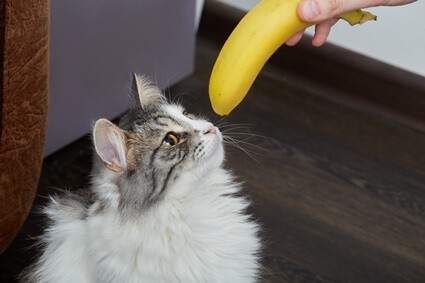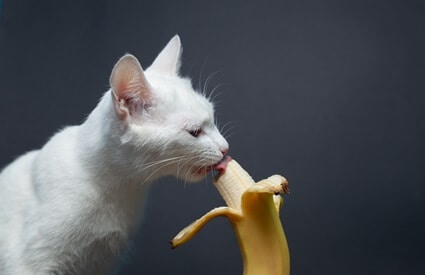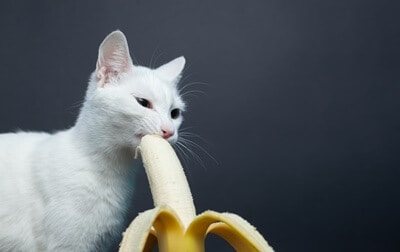Banana is among the world’s most popular fruits. If your cat is fed a few pieces of sliced banana, it won’t be adversely affected. However, too much banana can have unwanted side effects.
Banana is safe and healthy for cats, but feed them no more than 1-2 thin slices. Even if cats like the flavor, don’t give them a whole banana. This fruit contains too much sugar, which can lead to weight gain and digestive issues. The peel has a bitter, rubbery texture and is a choking hazard.
Most cats will show little interest in eating banana as they’re disinterested in sweet tastes. However, banana does have a distinctive scent, and cats may be curious about the unusual, distinctive smell.
Do Cats Like Bananas?
As explained by PloS Genetics, cats cannot taste sugars.
Your cat will be curious about what you’re doing when you peel a banana. It’s safe to offer a small slice as it’ll likely be indifferent to the sweet taste.
However, some cats enjoy sweet-tasting fruits. As a species, cats will always be more interested in protein-rich foods. However, if your cat asks for some banana, it’s likely just curious.
Bananas have a strong, distinctive scent, which some cats may find appealing. Also, the cat will see you eating a banana and, given that cats are natural imitators, they may want to try what you’re eating.
If your cat wants to try banana, offer it a very small piece, and it’ll likely spit it out.
Are Bananas Good for Cats To Eat?
The health benefits of feeding cats bananas are as follows:
Potassium Chloride
100 grams of banana contains 358 mg of potassium.
Potassium is a mineral responsible for heart and kidney function, which is essential in senior cats.
However, well-balanced senior cat food will provide all the vitamins and minerals that cats need. If further supplementation is required, take advice from a veterinarian, particularly if your cat has renal problems.
If your cat’s blood potassium level is low, it’ll develop hypokalemia. The occasional feeding of bananas in appropriate amounts can be beneficial.
Conversely, excessive banana can lead to hyperkalemia.
Vitamin B6 (Pyridoxine)
There is 0.4 mg of vitamin B6 in 100 grams of banana.
Vitamin B6 is critical for the performance of the organs in the feline body, including kidney function.
Vitamin B6 is shed in urine throughout the day and needs to be replaced.
Manganese Oxide
There’s 0.57 mg of manganese in 100 grams of banana.
Manganese can be beneficial to the skin as it encourages the creation of collagen. However, cats require little manganese to meet their daily needs.
A deficiency of manganese oxide is very rare in cats.
Vitamin C (Ascorbic Acid)
There is 8.7 mg of vitamin C in 100g of banana.
Vitamin C protects against cell oxidation due to the aging process. However, cats don’t have a Vitamin C dietary requirement as their bodies are able to produce enough on their own.
Oranges are a good source of Vitamin C, but cats usually dislike them intensely.
Are Bananas Bad For Cats?
Take the following risks into consideration before feeding your cat banana:

Simple Sugars (Carbohydrates)
There are 12 g of naturally occurring sugar in 100 grams of banana. That’s more sugar than is found in strawberries, which contain just 4.9 g per 100 grams.
The obvious risk of sugary foods is obesity. Senior cats, in particular, move less than they once did, so their calorie intake must be controlled.
Obesity leads to a heightened risk of feline diabetes. The Journal of Nutrition confirms that weight gain is linked to diabetes in cats.
We need to consider sugar’s impact on a cat’s teeth. There are risks involved with professional tooth cleaning, especially for senior cats. A low-sugar diet reduces the chances of tooth decay.
Weight Gain And Obesity
Carbohydrates are one of the five major food groups.
In felines, carbohydrates are surplus to requirements and aren’t processed efficiently by their body. If the cat doesn’t burn off these calories, obesity is likely in the long run.
As explained by Veterinary Sciences, carbs are detrimental to a cat’s long-term health. Wild cats actively seek out low-carbohydrate diets. Wild prey, such as rodents and birds, are rich sources of pure protein.
A domesticated cat begging for carbs is a learned behavior. Cats are obligate carnivores and need a meat-based diet.
Are Bananas Safe For Kittens?
For the first 12 months, banana should not be fed to kittens. They should just eat specially-formulated food to support their physical growth and development.
After 12 months have elapsed, 1-2 small slices of banana can be introduced. However, treats (as a whole) should only account for around 10% of a cat’s daily caloric intake.
Kittens should never be fed banana skin.
Types of Banana For Cats
There are various ways to give banana to cats, but they’re not all healthy or recommended.
Here’s an assessment of the most common ways to service banana to cats:
Banana Chips
The best way to offer banana chips to a cat is to get a dehydrator.
Making your own banana chips is healthier than relying upon store-bought chips. The latter are usually deep-fried in fat and add salt for flavor.
By slicing and dehydrating at home, you know exactly what you’re feeding your cat.
Mashed Banana
Banana mash is good for cats when constipated.
Mash an appropriate dosage of banana up and add water for hydration. Mix this in with food or serve in a saucer.

Frozen Banana
A cat that enjoys banana may appreciate frozen banana slices during the summer.
Dilute the banana with water as it’ll make the fruit moist and easier to digest. It also improves hydration levels, but banana contains less water than many fruits, such as watermelon.
Banana Bread
Cats love the scent of fresh bread due to the presence of yeast.
Banana bread has other ingredients that cats enjoy, such as butter and nuts. However, none of the added ingredients in banana bread are good for cats.
Never offer the raw ingredients of banana bread mix to a cat as the yeast will expand in the stomach.
Banana Milk
Never offer a cat banana milk as most cats are lactose intolerant. The cat will experience gas, bloating, and diarrhea after consuming dairy products. Also, banana milk contains more sugar and fat than traditional milk.
Can Cats Eat Banana Peel?
Cats can’t eat banana peel as it’s tough, and most cats will struggle to chew through it. So, the peel is a choking hazard as your cat may attempt to swallow it before sufficient mastication.
Also, banana peel consumption could result in an intestinal blockage or even death.
Bananas aren’t harmful to cats, but they’re not essential to the feline diet. While we all want to vary what we feed our pets, cats are obligate carnivores that thrive on a meat-based (high protein) diet.

